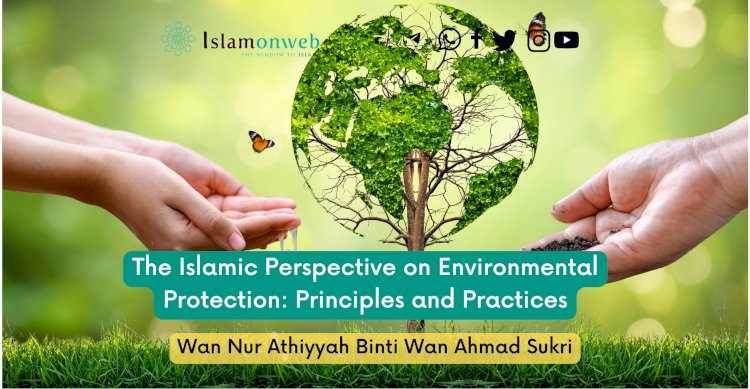The Islamic Perspective on Environmental Protection: Principles and Practices
Introduction
Environmental protection is an important element to ensure the continuity of human life in this world. According to Islam, environmentalism[1] is based on the teaching of monotheism (tawhid) or understanding of unity that combines the awareness of humans, nature, and God. Islam makes morality the core of the relationship between humans, nature, and God. The environment covers the entire area inhabited by humans. The environment is also an asset or storage of natural resources whether material in a certain community group or population, at a certain time and place to perfect and meet human needs from time to time.
Environmental protection has become a growing concern for many people and countries around the world. The issue of environmental degradation has become a global challenge, affecting not only humans but also the natural ecosystems around us. In recent years, there has been a growing interest in understanding the Islamic perspective on environmental protection, as Muslims make up a large proportion of the world's population. In this article, we will explore the principles and practices of environmental protection in Islam.
Principles of Environmental Protection in Islam:
Islam is rich in principles that are suitable for the protection of the environment. Islamic teachings emphasize the idea of "amanah" or trust, which refers to the responsibility entrusted to humans to care for the environment and its resources. First of all, we must study the principle of khalifah (stewardship) and trust (Amanah)[2]. These principles are the basis of environmental protection according to Islam. This is because this concept determines the role of humans created in this world as a caliph (khalifah). In the Qur'an, Allah states: (Behold, thy Lord said to the angels: "I will create a vicegerent on earth.")[3]. This verse shows that Man has also been assigned as a caliph on earth who is responsible for managing this earth as best as possible. Humans are part of God's creation and have a close relationship with the surrounding nature.
In addition to that, Allah presents us with a special gift when compared to other creatures, which is the ability to think. The award comes with the trust given to us; and we will be questioned in the afterlife about what we do to ourselves, other creatures, and this world. With that, we as caliphs and leaders of this world are responsible to administer this world as best as possible, in line with the purpose of our creation. The vast nature of Allah's creation provides space for research and learning for humans to conduct research that can benefit mankind. In addition, it is also a way of thinking to know Allah in an effort to strengthen faith in him[4]. Islam encourages us to look at nature and contemplate its majesty. By using common sense to see Allah's creation, then leads to the noblest appreciation and being grateful for His mercy. Looking at the environment while being grateful for God's vast mercy is indeed encouraged in the Quran, (Behold! in the creation of the heavens and the earth, and the alternation of night and day, - there are indeed Signs for men of understanding,).[5]
Another main principle in Islam regarding the protection of the environment is the concept of "tawhid" which means the unity and oneness of God. Allah S.W.T created the world perfectly in its occurrence without any deficiency in the slightest. The system that has been put in place by Allah S.W.T is very systematic without the need for human help to improve it[6]. This matter can be seen as the words of Allah S.W.T: (He Who created the seven heavens one above another: No want of proportion wilt thou see in the Creation of (Allah) Most Gracious. So, turn thy vision again: seest thou any flaw?)[7]. Monotheism is reflected in the interconnectedness of all things in nature. This world is created for humans. Every living being, plant, and non-living element is connected in a vast network of relationships and interactions. The destruction of one element of nature can have a domino effect on the entire ecosystem. Perfect monotheism is not limited to the mere expression of faith, it even needs to be strengthened by proving the manifestation of faith through righteous deeds by obeying all the commands of Allah and presenting the character of Ihsan that acts as a monitor and overseer in every act. All actions are based on seeking God's pleasure and not just material goals. As trustees who are responsible for this earth, good environmental management is a manifestation of the faith and obedience of Muslim individuals to Allah's commands.
In addition, the Qur'an also states that the earth is a living entity, which should be treated with respect and caution in line with the concept of justice. Allah S.W.T ordered that the results of the earth's resources should be well managed, distributed and utilized by the people of a country. For example, agricultural products, livestock, logging, petroleum, minerals, gold and many more[8]. This includes human actions towards the environment, by not causing damage. We need to realize that the various disasters and environmental damage that occur around the worldare caused by the greed and carelessness of humans themselves. The Word of Allah SWT
(ظَهَرَ الْفَسَادُ فِي الْبَرِّ وَالْبَحْرِ بِمَا كَسَبْ اَيْدِي النَّاسِ لِيُذِيقَهُم بَعْضَ الَّذِي عَمِلوا لَعَلَّهُمْ يَرجِعُونَ)[9].
Mischief has appeared on land and sea because of (the meed) that the hands of men have earned that (Allah) may give them a taste of some of their deeds: in order that they may turn back (from Evil).
Therefore, Muslims are urged to be careful and must have a moral obligation to protect the environment and ensure the rights of all living beings are respected.
Environmental care practices in Islam
Environmental damage, pollution, and reduction of natural resources as well as disruption of natural balance will endanger human life itself. For example, illegal logging and mining that is carried out will affect the structure of the land and become the cause of life-threatening landslides. River water pollution due to the disposal of hazardous toxic waste will cause poisoning of water resources and may affect health. Perversion and damage to the environment such as over-harvesting will threaten the survival of future generations. Therefore, Islam has provided many guidelines and practical practices that promote environmental protection. Some of these practices include:
Water Conservation: Islam emphasizes the importance of water conservation. Water is an important natural resource for survival. The lack must have a big impact on everyone. Humans can only live for three days without water[10]. Therefore, Muslims are encouraged to use water wisely, and wasting it is considered a sin. One of the practices that we follow and often leads to waste is ablution. In general, every Muslim must perform ablution five times a day. Unfortunately, many of us use excessive amounts of water. It is illegal to wastewater during ablution. This was clearly prevented by the Prophet Muhammad peace be upon him, “‘Abdallah b. ‘Amr b. al- ‘As said that the Prophet came upon, Sa'd when he was performing ablution and asked, “What is the meaning of this extravagance, Sa'd?” He replied, “Is there extravagance in ablution?” He said, “Yes, even if you are beside a flowing river.’’)[11]. How much Islam emphasizes being frugal in the use of water, so much so that even in matters of ablution, it is controlled so that there is no waste. Allah says in the Qur'an
(إِنَّ الْمُبَذِّرِينَ كَانُوا إِخْوَانَ الشَّيَاطِينِ)[12].
This verse shows that if we commit waste, we are part of the syaitan’s brothers. From that, we know how important it is that we be prudent and avoid waste in our daily worship. If when doing ablution, the Prophet Muhammad, peace be upon him, instructed us not to overdo it, let alone with our other daily activities.
Protection of Trees and Plants: Islam emphasizes the importance of protecting the environment by asking its followers not to cut down trees, pollute rivers and air. In fact, in Islam, agriculture and planting trees is one of the noble jobs and are highly encouraged by Allah SWT and Rasulullah SAW. Many verses of the Qur'an mention various crops and fruits. In terms of aqidah, agriculture can bring a servant closer to Allah SWT. This is because the sign of the greatness of Allah SWT can be seen clearly in the process of the occurrence of the plantation[13]. Muslims are urged to plant trees and participate in reforestation efforts. Prophet Muhammad SAW also taught his people to always protect animals and plants. On the authority of Anas, he said, the Messenger of Allah, may God bless him and grant him peace, said,
“مَا مِنْ مُسْلِمٍ يَغْرِسُ غَرْسًا أَوْ يَزْرَعُ زَرْعًا فَيَأْكُلُ مِنْهُ طَيْرٌ أَوْ إِنْسَانٌ أَوْ بَهِيمَةٌ إِلاَّ كَانَ لَهُ بِهِ صَدَقَةٌ “[14].
Muslims are also encouraged to avoid wasteful practices such as overgrazing and deforestation. Islam promotes sustainable agricultural practices, which involve using natural methods to grow crops and raise livestock. Muslims are encouraged to avoid the use of harmful chemicals and promote biodiversity.
Responsible consumption: Muslims are encouraged to be responsible consumers and avoid overdoing it. This includes buying environmentally friendly products and reducing the use of single-use plastics. Not only that, but we also need integrated enforcement in combating illegal logging. This is because illegal logging is one of the activities that also destroys and pollutes our environment including rivers and seas. The illegal logging work will also lead to the destruction of most of the existing natural habitats of freshwater fish. In addition to destroying the natural habitat of freshwater fish, illegal logging activities will also destroy most forest habitats which in turn will lead to other problems such as soil erosion, floods, global warming, and so on. We should realize that the forest habitat is very important not only to us but also to our environment. As we all know, the existence of plants is very important to the environment and it is very necessary to allow the use of carbon dioxide by plants and the return of oxygen for respiration purposes.
Conclusion
In conclusion, protecting the environment is the responsibility of every Muslim since it is closely related to religion. With the presence of positive changes along with the intention to protect Allah's nature, it can have a long-term effect for us to protect the only earth we have in the hope of gaining His pleasure. By following the principles and practices of environmental protection in Islam, Muslims can help create a healthier and more sustainable world for future generations.
References
Adhar, Zaid. “7 Prinsip Kelestarian Alam Sekitar Mengikut Acuan Islam.” HarakahDaily, April 15, 2020. https://harakahdaily.net/index.php/2020/04/15/7-prinsip-kelestarian-alam-sekitar-mengikut-acuan-islam/.
Ashraf, Mohamad. “Bayan Linnas Siri Ke-205: Pertanian Di Dalam Islam.” Pejabat Mufti Wilayah Persekutuan, August 3, 2019. https://muftiwp.gov.my/en/perkhidmatan/artikel-soal-jawab/3616-bayan-linnas-siri-ke-205-pertanian-di-dalam-islam.
Azmi Sharom. “Islam Dan Alam Sekitar,” June 2001. https://eprints.um.edu.my/13671/1/0001.pdf.
Dr. Mohd Farhan Md Ariffin, and Ibrahim Adham Mohd Rokhibi. “Kenapa Islam Amat Menghargai Air.” bebas news, July 24, 2021. https://bebasnews.my/2021/07/24/kenapa-islam-amat-menghargai-air/.
Meerangani, Khairul Azhar. “Kepentingan Penjagaan Alam Sekitar Menurut Perspektif Maqasid Syariah,” February 2018. https://www.researchgate.net/publication/323118346_KEPENTINGAN_PENJAGAAN_ALAM_SEKITAR_MENURUT_PERSPEKTIF_MAQASID_SYARIAH.
Shaheen Alī S B, A study on Imam Aḥmad Reza Khān Barelwi’s life and teachings for Muslims reforms in modern India, Visvesvaraya Technological University, Belagavi, Karnataka, India.
Endnotes
[1] Environmentalism is the study of the environment and the belief that it must be protected from damage by human activities.
[2] Azmi Sharom, “Islam Dan Alam Sekitar,” June 2001, https://eprints.um.edu.my/13671/1/0001.pdf.
[3] Surah Al-Baqarah: verse 30
[4] Khairul Azhar Meerangani, “Kepentingan Penjagaan Alam Sekitar Menurut Perspektif Maqasid Syariah,” February 2018, https://www.researchgate.net/publication/323118346_Kepentingan_Penjagaan_Alam_Sekitar_Menurut_Perspektif_Maqasid_Syariah
[5] Surah Al-Imran: verse 190
[6] Zaid Adhar, “7 Prinsip Kelestarian Alam Sekitar Mengikut Acuan Islam,” HarakahDaily, April 15, 2020, https://harakahdaily.net/index.php/2020/04/15/7-prinsip-kelestarian-alam-sekitar-mengikut-acuan-islam/.
[7] Surah Al-Mulk: verse 3
[8] Azmi Sharom, “Islam Dan Alam Sekitar,” June 2001, https://eprints.um.edu.my/13671/1/0001.pdf.
[9] Surah Ar-Ruum: verse 41
[10] Dr. Mohd Farhan Md Ariffin and Ibrahim Adham Mohd Rokhibi, “Kenapa Islam Amat Menghargai Air,” bebas news, July 24, 2021, https://bebasnews.my/2021/07/24/kenapa-islam-amat-menghargai-air/.
[11] Ahmad and Ibn Majah, sunan ibn majah 425, kitab taharah wa sunnanuha, باب مَا جَاءَ فِي الْقَصْدِ فِي الْوَضُوءِ وَكَرَاهِيَةِ التَّعَدِّي فِيهِ, vol. 1, book 1, hadith 425, https://sunnah.com/ibnmajah:425
[12] Surah Al-Isra`: verse 27).
[13] Mohamad Ashraf, “Bayan Linnas Siri Ke-205: Pertanian Di Dalam Islam,” Pejabat Mufti Wilayah Persekutuan, August 3, 2019, https://muftiwp.gov.my/en/perkhidmatan/artikel-soal-jawab/3616-bayan-linnas-siri-ke-205-pertanian-di-dalam-islam.
[14] Riwayat al-Bukhari (2320)
About the author
Wan Nur Athiyyah Binti Wan Ahmad Sukri is an undergraduate student of the Department of Fiqh and Usul al-Fiqh at International Islamic University (IIUM), Kuala Lumpur.
Disclaimer
The views expressed in this article are the author’s own and do not necessarily mirror Islamonweb’s editorial stance.

























Leave A Comment